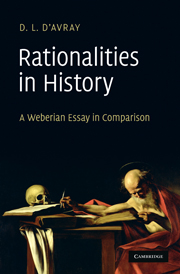Book contents
- Frontmatter
- Contents
- Preface and acknowledgements
- Introduction
- 1 Universal and specific rationalities: theories
- 2 The structure of values and convictions
- 3 Dynamics of values and convictions
- 4 The instrumental–conviction rationality interface
- 5 Formal rationality
- 6 The formal–substantive interface
- Conclusions
- Appendix: rationalities in a case before the Congregation of the Council
- Bibliography
- Index
2 - The structure of values and convictions
Published online by Cambridge University Press: 05 June 2012
- Frontmatter
- Contents
- Preface and acknowledgements
- Introduction
- 1 Universal and specific rationalities: theories
- 2 The structure of values and convictions
- 3 Dynamics of values and convictions
- 4 The instrumental–conviction rationality interface
- 5 Formal rationality
- 6 The formal–substantive interface
- Conclusions
- Appendix: rationalities in a case before the Congregation of the Council
- Bibliography
- Index
Summary
In the previous chapter the failure of Rational Choice Theory to explain the constitution of values was included among the problems with that whole approach to rationalities. ‘There's no accounting for tastes’ may be an adequate response to the choice of Pepsi rather than Coke (or vice versa) but not to contrasting ideas in Islamabad and Ann Arbor about the relation between the sexes. Here the Rational Choice theorists need to listen to historians. Conversely, historians need to lift their empirical expertise up to a higher level of generality to understand why so many different value systems have such a tenacious purchase on different sets of minds. It can hardly be genetic! G. A. Cohen tries a thought experiment about identical twins separated at birth:
One was raised as, and remains, a devout Presbyterian. The other was raised as, and remains, a devout Roman Catholic. They argue against each other's views, but they've heard those arguments before, they've learned how to reply to them, and their opposed convictions consequently remain firm.
The study of value systems is a field par excellence where the old discipline of History, if allowed to go beyond period specialisation to comparisons disciplined by clear concepts, can redress the imbalance in the relatively new field of Rational Choice.
- Type
- Chapter
- Information
- Rationalities in HistoryA Weberian Essay in Comparison, pp. 66 - 93Publisher: Cambridge University PressPrint publication year: 2010



